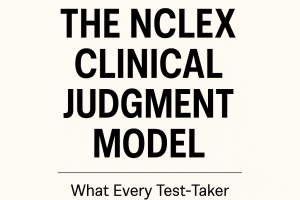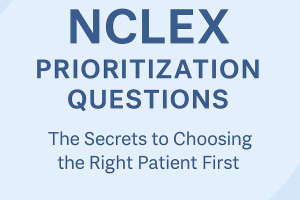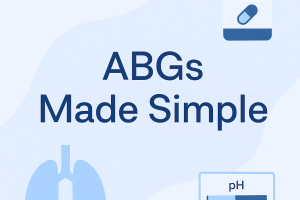Understanding Hypertension in Preparation for the NCLEX Exam

Hypertension, or high blood pressure, is a critical topic for the NCLEX exam and an essential aspect of nursing practice. This blog post will provide a comprehensive overview of hypertension, including its types, pathophysiology, risk factors, symptoms, diagnosis, treatment, and nursing interventions. We’ll also include sample NCLEX questions to aid in your preparation.
What is Hypertension?
Hypertension is a condition characterized by persistently elevated blood pressure, which puts extra strain on the heart and blood vessels. According to the American Heart Association, hypertension is defined by:
- Systolic Blood Pressure (SBP): 130 mm Hg or higher
- Diastolic Blood Pressure (DBP): 80 mm Hg or higher
Types of Hypertension
- Primary (Essential) Hypertension: This is the most common type and develops gradually over many years. It has no identifiable cause, though multiple factors may contribute to its development.
- Secondary Hypertension: This type is caused by an underlying health condition or the use of certain medications. Conditions that can lead to secondary hypertension include:
- Kidney Disease: Chronic kidney disease can lead to high blood pressure due to fluid retention and hormonal changes.
- Endocrine Disorders: Conditions like hyperaldosteronism or pheochromocytoma.
- Medications: Such as oral contraceptives, corticosteroids, and some antidepressants.
Pathophysiology
Hypertension results from increased resistance in the arterial system, which can be due to:
- Increased Cardiac Output: The heart pumps more blood per minute, increasing pressure in the arteries.
- Increased Peripheral Resistance: Narrowing of the arteries due to plaque buildup or vasoconstriction increases resistance.
- Volume Overload: Excess fluid in the blood vessels raises blood pressure.
Risk Factors
- Age: The risk of hypertension increases with age.
- Family History: Genetic predisposition plays a role.
- Obesity: Excess body weight contributes to increased blood pressure.
- Diet: High sodium intake, low potassium levels, and excessive alcohol consumption can elevate blood pressure.
- Physical Inactivity: Lack of exercise is associated with higher blood pressure.
- Smoking: Tobacco use damages blood vessels and increases blood pressure.
- Chronic Stress: Prolonged stress can lead to temporary or sustained increases in blood pressure.
Symptoms
Hypertension is often called the “silent killer” because it may not present with symptoms until significant damage has occurred. When symptoms are present, they may include:
- Headaches: Particularly in the morning.
- Dizziness: Feeling lightheaded or unsteady.
- Blurred Vision: Due to damage to the blood vessels in the eyes.
- Nosebleeds: Frequent or unexplained nosebleeds.
- Shortness of Breath: Can be due to heart failure or other complications of uncontrolled hypertension.
Diagnosis
- Blood Pressure Measurement: Multiple readings over time are necessary for an accurate diagnosis. The diagnosis is based on consistently elevated readings.
- Ambulatory Blood Pressure Monitoring: Measures blood pressure at regular intervals over 24 hours to assess variations.
- Laboratory Tests: To identify underlying causes or complications, such as kidney function tests, cholesterol levels, and glucose levels.
- Imaging: May be used to evaluate damage to organs or detect secondary causes, such as kidney ultrasound or echocardiogram.
Treatment
Lifestyle Modifications
- Diet: Adopt a heart-healthy diet, such as the DASH (Dietary Approaches to Stop Hypertension) diet, which emphasizes fruits, vegetables, whole grains, and lean proteins while reducing sodium intake.
- Exercise: Engage in regular physical activity, such as brisk walking for at least 150 minutes per week.
- Weight Management: Achieve and maintain a healthy weight.
- Limit Alcohol: Reduce alcohol consumption to moderate levels.
- Quit Smoking: Eliminate tobacco use to improve cardiovascular health.
Pharmacological Management
- Diuretics: Help reduce fluid volume and lower blood pressure (e.g., hydrochlorothiazide).
- ACE Inhibitors: Block the conversion of angiotensin I to angiotensin II, reducing blood vessel constriction (e.g., lisinopril).
- Angiotensin II Receptor Blockers (ARBs): Prevent the action of angiotensin II (e.g., losartan).
- Calcium Channel Blockers: Relax blood vessels by preventing calcium from entering cells (e.g., amlodipine).
- Beta-Blockers: Reduce heart rate and cardiac output (e.g., metoprolol).
- Renin Inhibitors: Directly inhibit renin to lower blood pressure (e.g., aliskiren).
Complications
- Cardiovascular Disease: Increased risk of heart attack, heart failure, and stroke.
- Kidney Damage: Chronic kidney disease or kidney failure.
- Vision Loss: Retinopathy can lead to decreased vision or blindness.
- Aneurysm: Weakening of blood vessel walls can lead to aneurysms.
- Cognitive Decline: Long-term hypertension can affect cognitive function and increase the risk of dementia.
Nursing Interventions
- Monitor Blood Pressure: Regularly check and record blood pressure readings.
- Assess for Symptoms: Watch for signs of hypertension-related complications.
- Educate the Patient: Provide guidance on lifestyle modifications, medication adherence, and the importance of regular monitoring.
- Encourage Medication Compliance: Ensure the patient understands how to take their medications and the potential side effects.
- Support Lifestyle Changes: Offer resources and support for dietary changes, weight management, and smoking cessation.
- Monitor for Side Effects: Be vigilant for potential adverse effects of antihypertensive medications.
Sample NCLEX Questions
Question 1
A patient with hypertension is prescribed lisinopril. Which instruction should the nurse include in the teaching plan?
A. “Take the medication with food to increase absorption.”
B. “Avoid eating foods high in potassium.”
C. “Increase your intake of dairy products.”
D. “You may need to take your blood pressure more frequently.”
Answer: B. “Avoid eating foods high in potassium.”
Question 2
A patient with hypertension presents with a headache, dizziness, and blurred vision. Which of the following conditions should the nurse be most concerned about?
A. Stable angina
B. Stroke
C. Myocardial infarction
D. Peripheral artery disease
Answer: B. Stroke
Question 3
A nurse is discussing lifestyle changes with a patient who has hypertension. Which statement indicates that the patient understands the recommendations?
A. “I will try to eat less red meat and more fruits and vegetables.”
B. “I will start smoking less to help control my blood pressure.”
C. “I will reduce my intake of calcium to help lower my blood pressure.”
D. “I will avoid any physical activity to prevent strain on my heart.”
Answer: A. “I will try to eat less red meat and more fruits and vegetables.”
Question 4
Which blood pressure reading indicates stage 1 hypertension according to the American Heart Association guidelines?
A. 120/80 mm Hg
B. 130/85 mm Hg
C. 140/90 mm Hg
D. 160/100 mm Hg
Answer: C. 140/90 mm Hg
NCLEX Preparation Tips for Hypertension
- Understand Blood Pressure Categories: Familiarize yourself with normal, elevated, and hypertensive ranges.
- Know Risk Factors and Complications: Be able to identify risk factors for hypertension and understand potential complications.
- Medication Knowledge: Understand the classes of antihypertensive medications, their mechanisms, and side effects.
- Lifestyle Modifications: Recognize the importance of lifestyle changes in managing hypertension and be able to educate patients effectively.
- Practice Questions: Use NCLEX-style questions to test your understanding and prepare for exam scenarios.






